- Home
- Jordan Sonnenblick
Zen and the Art of Faking It
Zen and the Art of Faking It Read online
Zen and the Art of Faking It
Jordan Sonnenblick
Scholastic Press New york
To my darling bride, Melissa, who has the patience of a Zen Master
Table of Contents
Title Page
Dedication
a note to the reader
welcome to nowheresville
be yourself
buddha meets howling monkey
i become one with my buddha nature
sitting master, freezing rock
the right path
not the true tao
no-mind
the wednesday plan
wash your bowl
calls and misses
signs and wonders
second helping
face-to-face, toe-to-toe
twigs
one hand washes the other
service for seven, and a hundred feet in the air
got zen?
slam, dunk, crack—part one
slam, dunk, crack—part two
return to sender
the revenge of peter jones
san lee: boy outcast
wash your bowl some more
having changed, you pass through
a quick word from the author:
Copyright
a Note to the reader
Have you ever switched schools? I have, and let me tell you—a school is a school is a school. Every middle school on God’s green earth smells exactly the same, because damp lockers, industrial cleaning fluids, and puke are universal. The lunch is the same: How many ways can you flavor a freakin’ Tater Tot? The guys are the same: like a show on Animal Planet without the cuddle factor. The girls are the same: Martians with human hormones. And the teachers?
Please.
So when I dragged my feet in their rotting sandals through the gray midwinter slush and up the poured-concrete stairs of Harrisonville Middle School for the first time, I knew exactly what I was getting into.
Sure I did.
welcome to nowheresville
So. Eighth grade. Second semester. New state. Math was math—algebra, of course. They always stick the Asian kid in the algebra class. Science was science. Fortunately I know how to roll a stupid little metal car down a ramp and use a stopwatch, so no problemo there. In English, all I could figure out the first day was that the teacher was nuts—so again, same stuff, different time zone. Gym, lunch—I honed my skills at standing and sitting in the corner. I also continued my long-standing tradition of eating nothing but pasta and fruit in the cafeteria—I’d never been to a public school that knew how to cook actual meat. Oh, I almost forgot home economics. Brownies. Made with applesauce. No wonder America’s kids have lost their way.
It wasn’t until the last class of the day that I even woke up. Now, back in Houston, we had been studying U.S. history for the whole year. But in Pennsylvania, for some odd reason, this one school had a special “Ancient World immersion grant,” which meant two things:
one: We’d be spending five months doing the exact same thing I’d done in seventh grade. Well, I guess you can never get enough pyramids, right?
two: I’d miss the whole second half of my country’s past. Which kinda stinks—I’d been looking forward to learning how that whole revolution thing had turned out.
Anyhoo, I walked into social studies class alone that day, hovered by the door until I could see which seats would be empty, and then eased my way along the wall and into a chair just as the teacher started clearing his throat to get the class quiet. Lucky me—the chair turned out to be missing half of one back leg. I hit the floor with a lovely BANG, and the whole class turned in time to enjoy the view of my books, pens, pencils, and transparent backpack tumbling down all over me.
Yay.
The teacher came hurdling over and reached down a hand to pull me up. I couldn’t help but notice he had a twinkle in his eye. An honest-to-God eye twinkle: How weird is that? You hear the cliché all the time, but in this case, it was literally true. The guy had a white beard on a chubby beet-red face and those sparkling eyes. My arm was being yanked out of its socket by Santa Claus. A little pretend voice in my head was telling me, Stay down! Stay down! But Santa would not be denied. When he wasn’t delivering packages down chimneys, this guy must have worked out like an Olympian.
“Hello, there!” he boomed. Then he paused and twinkled as I tried to be subtle about brushing pencil shavings out of the hair above my left ear. I figured the punch line was coming: “Nice of you to drop in—-har-har…” Or, “Whoa! Bartender! I’ll have whatever this kid is drinking!” But after a beat, all Santa said was, “You must be San Lee. I got a note that you’d be coming some time this week. I’m Mr. Dowd. Welcome to Harrisonville! You came at just the right time. We’re starting a new unit today, on…”
I tuned out the educational droning and checked out my classmates. Some of them had that look I’d seen in five other states—plus an airbase in Germany—like, The new kid fell. Cooooooollllll! Others just looked through me, like, This new person does not matter in my little Pennsylvania world. And one girl, with an unruly Aztec temple of brown hair and a Beatles T-shirt, peered over a pair of tiny purple-tinted glasses and gave me a smile that I felt all the way down to my soggy socks. She had these shocking gray eyes that locked right onto mine, angular cheekbones, and super-perfect teeth—which added up to a pretty intriguing look. Unfortunately I got so distracted by Beatle-girl’s face that I must have missed a fairly intense death-stare from the guy to her right.
Oh, well. At least there was one human being in this burg. Two, if you believed the friendly Santa guy was for real. I sat down, and class started. Mr. Dowd made everyone copy down a chalkboard full of notes about Buddhism. It looked remarkably like the chalkboard full of Buddhism I had copied down on the first day of a unit back in Texas. I muttered under my breath, “One moon shows in every pool; in every pool, the one moon.” My favorite teacher ever, Mrs. Brown, had said that, whenever I’d commented on how my school in Houston was just like the school before that in Alabama. Evidently it was the kind of thing that Zen masters went around saying in Japan hundreds and hundreds of years ago.
Mr. Dowd was staring at me. “Excuse me. Did you say something, Mr. Lee?”
You had to love his smooth use of the rhetorical question trick. I felt like blurting out, No, the fat kid in the corner is a ventriloquist and I’m his new dummy. Duh! But my mom had told me not to draw attention to myself, that this school was the end of the line for me. So I played nicely with others. “No, sir.”
He did the twinkle thing again. “That’s funny. I could have sworn you’d just murmured a really impressive quotation about the universal nature of reality. Guess it’s just the wax buildup in my ears playing tricks on me. Anyway…”
As Mr. Dowd launched into what I imagined was a breathtaking lecture on the various branches of Buddhism, I found myself glancing over at Beatle-girl. She was chewing on the eraser end of a pencil, concentrating intently on Santa Dowd’s every word. Come to think of it, so was almost everyone else. Maybe his lecture really was breathtaking. The guy next to Beatle-girl flicked his eyes over to me, and this time I caught the intensity, and the message: Back off!
I busied myself with decorating the cover of my new notebook. First I drew three interlocking yin–yang symbols. Then I wrote underneath the middle one, half in outline and half regular: THE LAUGHING ARCHER. That was the name of this really cool underground band in Houston that used to play all-ages shows in our neighborhood. The words accidentally filled up the line that said NAME, but since you always put your name in the heading on every page in every school notebook in the world anyway, that didn’t seem like
a huge problem.
It’s funny how innocently things start out.
be yourself
Before the thing with my dad got really ugly, he used to take me on these little outings. He went through phases, which makes sense in retrospect. So, in Houston, we went bayou fishing in a little flat-bottomed rowboat. In Alabama, it was jogging every Sunday after we got done with services at the Euphrates Baptist Church. Come to think of it, I guess going to the Baptist Church was part of that phase too. In Connecticut, we were Methodists, and I think when I was really little in California we might have been Unitarians for a while.
Whatever, it’s easy to get sucked into all the craziness just from trying to describe what happened with my dad, but I’ll try to stay on topic—in every state, I’ve noticed that’s the most important thing about writing for the standardized test. So: In California, the phase was archery. Dad and I would load our bows, our quivers full of arrows, and this big collapsible metal easel with a target on it into the back of the Volvo station wagon (or maybe California was the purple minivan), and set off for this gigantic field behind a hunting-supply store. When we first started the archery thing, Dad bought one of those five-color five-circle targets to shoot at. I liked that target, because you got to practice math: The yellow bull’s-eye was worth nine points, the red ring around it was worth seven, the blue ring was five, black was three, and the outer white ring was one. You got six arrows, for a high score of fifty-four. This was second grade, and doing all that addition made me feel smart. Also, I was dying to shoot a perfect score, so I was psyched to go every week. I noticed that most of the other guys there had targets shaped like animals, though, and one Sunday when Dad unloaded the easel, our target of circles had been replaced by a realistic portrait of a young male deer. I was pretty displeased with this switch from practicing accuracy and computation to puncturing Bambi, so I asked my dad why we had gotten rid of the old target. He made a sweeping gesture toward all the hairy, grizzled-looking guys surrounding us with their paper zoo of cruelty, and said, “When in Rome, do as the Romans do. Remember that, OK? When in Rome, do as the Romans do.”
I could have spoken up, I know. I could have argued the point or begged for my old target back, or something. But even then I knew how my father got if you challenged him. So I turned back toward that easel and started aiming for the lungs.
On my second day of school, I was still trying out who to be in Pennsylvania: a skater, like I’d been in Cali? A Bible-thumper, like I’d been in Alabama? A rich preppy kid, like I’d been in Houston? A macho pretend-jock, like I’d been in Germany? People were always telling kids to be themselves, but either they didn’t mean it or they didn’t tell you how to go about doing it when everyone else was trying to push and pull you into line.
I was sitting in English class, concentrating on squidging the freezing-cold slush between my socks and my sandals by flexing my toes, when the teacher pinned a badly laminated rectangle of shocking-pink paper above the chalkboard. It was all wrinkly, like she’d accidentally gotten it jammed into the machine sideways, yanked it partway out, and then let it go back through. Come to think of it, that’s what her outfit looked like too: the absentminded librarian look. She said it was the Quote of the Day; you could definitely hear the capital letters too. What it said was one of those tired old sayings that pop up in the margins of every middle school agenda book: IF A MAN DOES NOT KEEP PACE WITH HIS COMPANIONS PERHAPS IT IS BECAUSE HE HEARS A DIFFERENT DRUMMER. LET HIM STEP TO THE MUSIC HE HEARS, HOWEVER MEASURED OR FAR AWAY. I knew from an old English classroom’s bulletin board that Henry David Thoreau had said it. I also knew it was the exact opposite of everything my dad had ever told me to act like.
Standing out? Forget about it.
The teacher launched into some long, drawn-out anecdote about Thoreau getting in trouble for his beliefs, which kind of reminded me of my dad. So I tuned out, grabbed one of my notebooks, and started making a list of possible identities for myself. When I had a bunch of candidates, I disqualified each one until my chart looked like this:
Identity Pros Cons
—JOCK? (girls like) Too much work. Also, I am spaz.
—SKATER? (cheap clothes) Too cold. Also, I am spaz.
—PREP? (good parties?) Too expensive.
—GOTH? Mom would kill.
Makeup expensive.
Also, piercings painful.
—EMO? See Goth.
Decisions, decisions. I was sick of pretending to be like everyone else—the artificial slang, the Internet research on sports I didn’t care about, the endless watching of MTV so I could learn song lyrics, dance moves, cool clothing brands. My dad’s way hadn’t been working out so well for either of us, plus he was gone. Maybe it was time to pretend something completely different. I didn’t actually hear the beat of a different drummer, but maybe I could pretend to be unique.
Be unique? It was so crazy it just might work. But what was unique about me? I was poor. I was Chinese. I was adopted. I had a screwed-up family. I feared bugs, especially spiders. None of those attributes necessarily jumped up and screamed, “LOOK! I’m a STAR!” I tried to come up with some amazing talent I might possess, but because of the whole change-interests-every-year thing, I only had a collection of semi-lame half-talents. And neither “You should see me almost play violin!” nor “Check out my stunning ability to juggle two objects!” sounded like the slogan of a successful middle school maverick.
I thought about it the rest of the day. This was much harder than figuring out how to follow the crowd. Being different, or at least pretending to be different, required creativity. Which I obviously didn’t have, or I wouldn’t have to INVENT a way to stand out in the first place. Like Beatle-girl: You took one look at her and knew she was hearing a different drummer. Maybe even a different kazoo. For all I knew, she might have been waltzing to the color of a different smell. She was out there anyway.
Example: At lunch in the cafeteria, Beatle-girl had come in two days in a row, dragged a stool over just past the cashiers at the end of the food line, set up an open guitar case in front of her, and started playing a beat-up old acoustic and singing folk songs. And she was really, really good! Her fingers flew over the strings, and her voice rang out sweetly even amid the clanking chaos of the lunchroom. She started both times with a song I’d never heard before, but after the second day it rang out in my head:
My brothers and my sisters
Are stranded on this road;
It’s a hot and dusty road
That a million feet have trod,
Rich man took my home and drove me from my door
And I ain’t got no home in this world anymore.
In some of the schools I’d attended, Beatle-girl would have been totally ignored. In others, she would have been a laughingstock. In one or two, she might have even wound up with a guitar case full of sloppy-joe goo. But here, some kids stood and watched her act, and some dropped their lunch change into the case as they came off the line.
I was so inspired that on Day Two I even left the safe little corner seat I’d staked out between the chessgeek and clarinet-player tables and walked up to watch. Her hair was a curtain over her face, and every once in a while between lines, she’d try to blow a few strands out of her eyes. Then she’d do a little shrug when the curtain closed over her glasses again.
It suddenly occurred to me that I loved this girl. I mean, her guitar had a gigantic sticker on it that said, THIS MACHINE KILLS FASCISTS. OK, I was admittedly a little fuzzy on what a fascist was, strictly speaking. And I didn’t know her name or anything. And she was evidently begging for spare change in a middle school cafeteria. But come on—Beatle-girl kicked serious butt.
Good thing I had probably won her heart by tumbling backward over my own chair at our first meeting. Chicks dig that kind of suave and manly display. Now all I had to do was talk to her, and she would most likely just melt into my muscled arms. My average arms. OK, my totally hairless, scrawny-chicken-looking ar
ms.
But first I had to figure out who I was this year. And it had to be good.
After three songs, Beatle-girl must have realized she needed to spend some of our luxurious twenty-four minutes of lunchtime eating, because she abruptly stopped playing, jumped up, grabbed the coins out of her case, and placed her fascist-killing machine in there. When she was done flipping the little latches on the case, she dragged her stool and the case to the edge of the nearest table. I vaguely attempted to make eye contact, if staring intently at her sandals as she strode right past me into the lunch line counts as an attempt. Hey, she wore sandals, just like me! We were practically cosmic twins!
I was still standing there, near the cashiers, trying to think of a great footwear-related pickup line, when Beatle-girl reemerged from the steamy kitchen with a hideous-looking wheat-type wrap, bursting with massive tufts of bean sprouts. The grim food choice almost forced me to turn my back on her as a potential life mate, but then she redeemed herself by grabbing a pack of chocolate cupcakes from the little shelf at the end of the counter just as she got to the cashier. Interestingly, she paid with a twenty.
Just as I was adding this info-nugget to my scanty store of Beatle-girl data, she looked right at me and spoke: “Woody.”
I had no idea how to respond to this, although I tried my best: “Uh, Buzz?”
“No, I mean my name is Woody. You’re the new boy, right? In my social studies class?”
I was thinking, No, I’ve been here since sixth grade, but nobody noticed, even though I’m the only Asian kid in the whole freaking school! But I was definitely learning how to bite back the sarcasm, so I said, “Yeah, that’s me. San. San Lee.”
She just looked at me expectantly, like she was waiting for me to burst into a furious tap-dance number. So I said, “I came here from Houston. Yesterday was my first day.”

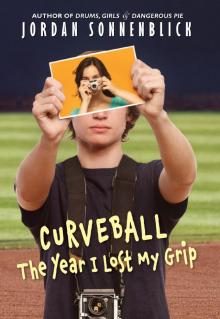 Curveball: The Year I Lost My Grip
Curveball: The Year I Lost My Grip Dodger for Sale
Dodger for Sale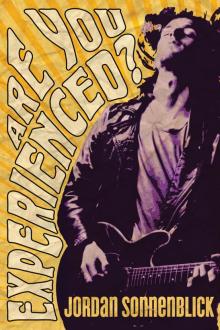 Are You Experienced?
Are You Experienced?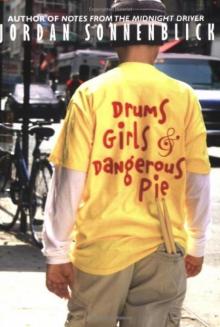 Drums, Girls & Dangerous Pie
Drums, Girls & Dangerous Pie Dodger and Me
Dodger and Me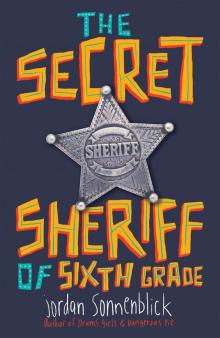 The Secret Sheriff of Sixth Grade
The Secret Sheriff of Sixth Grade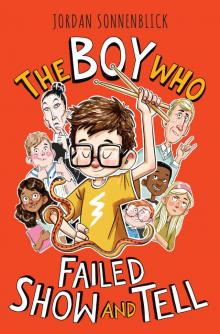 The Boy Who Failed Show and Tell
The Boy Who Failed Show and Tell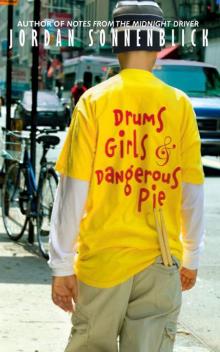 Drums, Girls, and Dangerous Pie
Drums, Girls, and Dangerous Pie Dodger for President
Dodger for President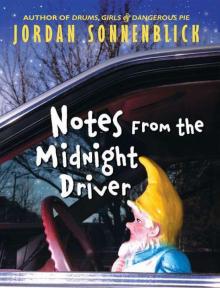 Notes From the Midnight Driver
Notes From the Midnight Driver After Ever After
After Ever After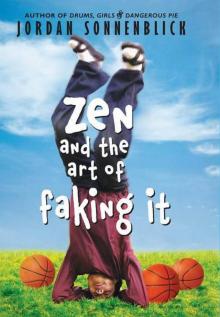 Zen and the Art of Faking It
Zen and the Art of Faking It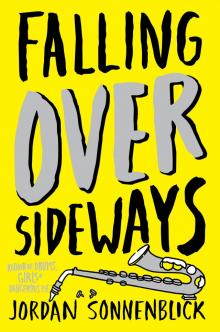 Falling Over Sideways
Falling Over Sideways